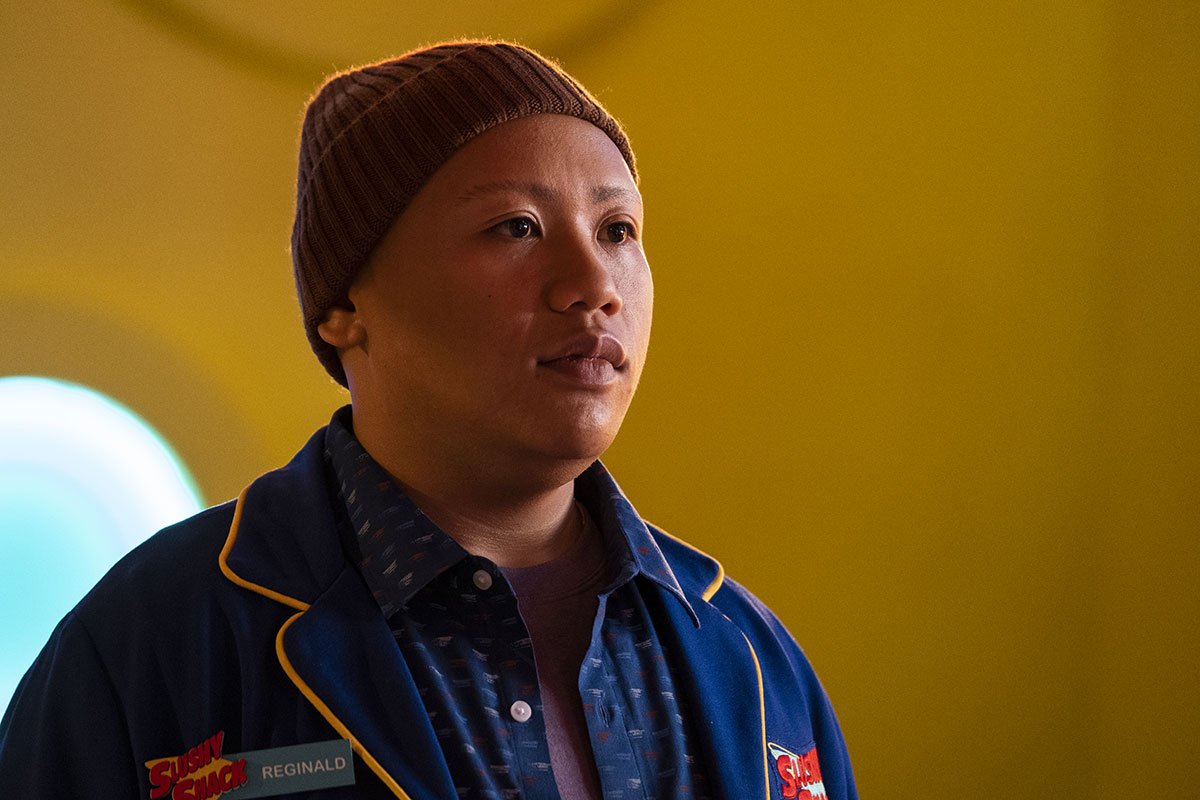Reginald the Vampire follows Reginald Baskin, a socially awkward and overweight young man who struggles with self-esteem and anxiety. He works at Slushy Shack, where his manager, Todd, constantly ridicules him, and he secretly admires his coworker Sarah. Based on Johnny B. Truant’s novel Fat Vampire, the series blends comedy and horror to examine what happens when an ordinary person suddenly gains supernatural power.
Reggie’s transformation into a vampire brings him abilities and immortality, but it does not remove the personal insecurities that have defined his life. The first season focuses on his attempts to reconcile newfound power with self-doubt, forming a story of growth and self-acceptance.
Reggie’s life changes dramatically when Maurice Miller, a centuries-old vampire, notices his desire for confidence. Maurice turns Reggie into a vampire, granting him immortality and unique powers, including rapid reading, telepathy with his sire, and the ability to influence other vampires. Despite these abilities, Reggie remains in the same body and retains his insecurities, highlighting the series’ message that external power cannot instantly solve internal struggles. His transformation serves as both a literal and metaphorical journey into a world of supernatural rules and societal expectations.
After becoming a vampire, Reggie confronts the practical and emotional difficulties of his new existence. Sunlight damages his skin, and he experiences a strong bloodlust that puts those around him in danger. He struggles to control these urges, particularly around Sarah, whose safety becomes a source of constant worry. Maurice acts as a guide, explaining the rules of vampiric life and teaching Reggie about restraint and responsibility. Reggie quickly learns that immortality comes with challenges that cannot be solved with power alone.

Reggie Learns Love, Prejudice, and Responsibility While Facing Challenges in Vampire Society
The vampire community introduces Reggie to strict standards of beauty and social status. Vampires such as LeBron, Penelope, Moira, and Isaac treat him with contempt because he does not fit the conventional image of tall, lean, and attractive vampires. This reflects the discrimination Reggie has faced in human society due to his weight. The show highlights both human and supernatural prejudices, portraying how superficial judgments shape self-esteem. Reggie’s powers allow him to resist some of these pressures, but he must continually prove his worth to others.
Reggie’s personal life becomes more complex after his transformation. Sarah initially does not know he is a vampire, and supernatural incidents such as memory lapses create tension in their relationship. Reggie also meets Nikki, a vampire assassin who develops feelings for him, forming a love triangle. Reggie’s insecurities and fear of failure prevent him from handling these relationships confidently. The series uses these complications to show that power does not guarantee happiness, and emotional maturity is necessary for forming meaningful connections.
Maurice’s backstory adds historical and social depth to the narrative. As a former member of the Black Panther Party, he faced racial prejudice before becoming a vampire under Angela’s guidance. His experiences with injustice and moral compromise shape his approach to teaching Reggie about ethics, self-restraint, and responsibility. Their relationship mirrors a father-son dynamic, emphasizing the importance of guidance, wisdom, and moral decision-making when facing extraordinary circumstances. Maurice’s mentorship reinforces Reggie’s growth and understanding of his role in the vampire world.

Reggie Faces Challenges, Prejudice, and Ethical Tests While Proving His True Worth
The season’s central conflict revolves around The Assessment, a vampire council test designed to determine Reggie’s eligibility within the vampire community. He faces arbitrary and biased standards that prioritize conventional beauty over skill or intelligence. Reggie struggles with these unfair challenges, which symbolize broader societal pressure to conform. Using creativity, intelligence, and his unique powers, Reggie passes several tests despite his appearance. The storyline emphasizes that resilience, courage, and critical thinking matter more than superficial standards or societal expectations.
Throughout the season, Reggie faces multiple threats, including Angela, hostile council members, and initially hostile vampires such as Nikki. He uses his powers strategically to protect his friends and himself. Notable moments include saving Maurice from danger and using Todd temporarily as a vampire to outsmart the council. These actions demonstrate Reggie’s growth in confidence, strategic thinking, and moral judgment. He learns to balance the use of his supernatural powers with ethical responsibility, showing that heroism involves both courage and consideration for others.
The show consistently addresses the theme of being different. Reggie experiences prejudice due to his weight, Maurice and Angela face racial discrimination, and Sarah struggles against the expectations of her religious upbringing. Reggie’s story emphasizes that being different can be a strength when combined with self-awareness and moral clarity. The series critiques superficial judgments and beauty standards, highlighting that true worth comes from character, empathy, and personal integrity. Reggie gradually accepts himself, learning to act with both confidence and compassion.
Season 1 ends with Reggie stronger, more self-aware, and prepared for future challenges. Although his relationship with Sarah remains uncertain, he demonstrates emotional growth and self-respect. Reggie’s actions during The Assessment ensure his survival and the protection of his friends. The finale also introduces new threats and unresolved conflicts, laying the groundwork for Season 2. With the show renewed by Syfy, the next season promises further adventures, testing Reggie’s courage, ethical choices, and ability to remain true to himself while facing the pressures of the vampire world.



